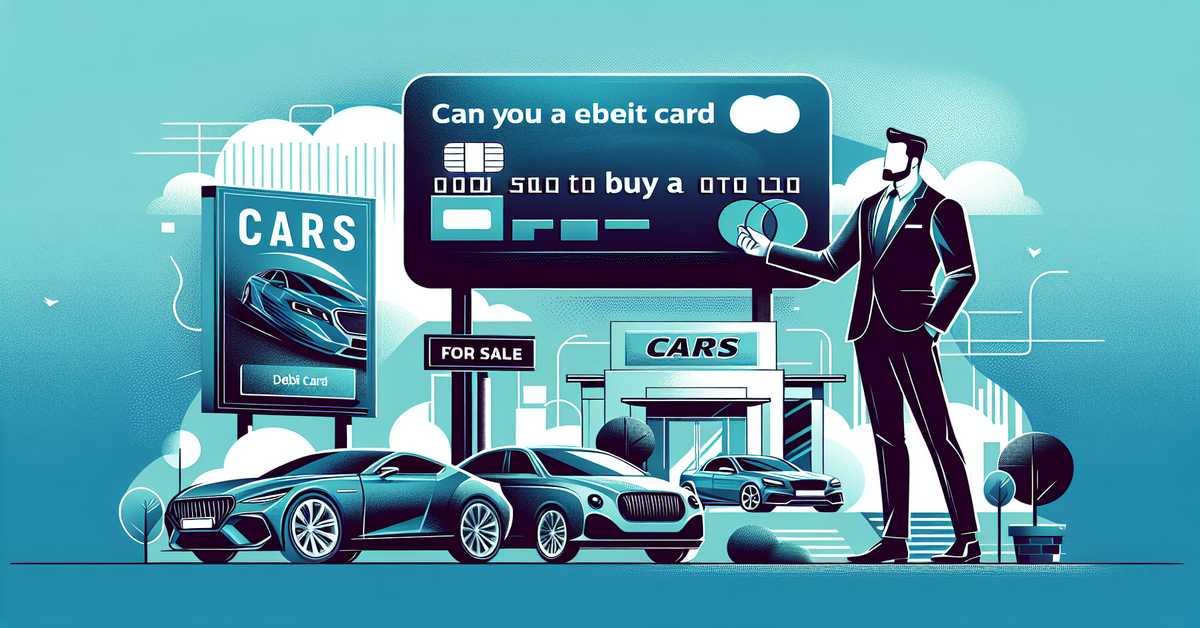You might wonder if it's really possible to use a debit card to buy a car. While some dealerships do accept debit payments, there are often significant restrictions and limits you might not anticipate. Understanding these dealership policies and the potential hurdles can be essential for your purchasing experience. So, what should you consider before trying to make a big-ticket purchase with your debit card?
Understanding Debit Card Transactions
Understanding how debit card transactions work is vital when considering using one to buy a car. Debit cards draw directly from your bank account, meaning the funds must be available at the time of purchase. This can provide a sense of security, as you won't be accumulating debt. However, it's important to be aware of transaction limits; most dealers have a cap on how much you can spend using a debit card. Additionally, be cautious of potential holds on funds, which can affect your account balance. Always verify the dealer's policies regarding debit card payments to guarantee a seamless transaction. Prioritizing your financial safety can help you avoid unexpected fees or complications during your car-buying experience.
Dealership Policies on Debit Cards
Different dealerships have varying policies regarding debit card payments, so it's important to check their specific rules before making a purchase. Some dealerships may accept debit cards for the full purchase price, while others might limit the transaction to a specific amount. Additionally, they may require you to provide identification or proof of funds. It's also common for dealerships to charge fees for debit card transactions, which can impact your total cost. Always ask about these fees upfront to avoid surprises. Finally, verify that the dealership has secure systems in place to protect your financial information during the transaction. Knowing these details can help you make a safer and more informed decision when buying a car.
Pros of Using a Debit Card
Using a debit card can offer several advantages when purchasing a car, especially in a landscape where dealership policies vary widely. One of the key benefits is that it allows for direct access to your funds, helping you avoid debt and keep your budget in check. Additionally, using a debit card can make the transaction quicker and more straightforward, minimizing the hassle often associated with financing.
- You can easily track your spending, ensuring you stay within your budget.
- There's typically no interest or hidden fees, providing transparency in your purchase.
These factors make using a debit card a safe and practical option for buying a car.
Cons of Using a Debit Card
While a debit card can simplify transactions, it also comes with drawbacks that may impact your car-buying experience. One major concern is the lack of purchase protection. Unlike credit cards, debit cards typically offer limited recourse for disputes, leaving you vulnerable if there's an issue with the vehicle. Additionally, using a debit card exposes your bank account directly to potential fraud. If someone gains access to your card information, they could drain your funds before you realize it. You might also miss out on rewards or cashback offers that many credit cards provide. Finally, if you encounter any financial difficulties, your debit card won't help you manage payments like a credit card might, putting you at further risk.
Payment Limits and Restrictions
When buying a car, you might find that debit cards come with payment limits that could hinder your ability to complete the transaction. Most banks impose daily spending caps, which can be considerably lower than the price of a vehicle. Here are some key restrictions to reflect on:
- Daily Withdrawal Limits: Check your bank's limit, as it may not cover the car's total cost.
- Merchant Acceptance: Not all dealerships accept debit cards for large purchases, requiring alternative payment methods.
Understanding these limits can help you plan your purchase and guarantee a smooth transaction, keeping your financial safety in mind.
Alternatives to Debit Card Payments
If debit card limits or dealership policies pose challenges, consider alternative payment methods that can facilitate your car purchase more smoothly. Here are some safe options to explore:
| Payment Method | Benefits | Considerations |
|---|---|---|
| Bank Transfer | Direct, secure transactions | May take time to process |
| Cashier's Check | Trusted by dealerships | Verify proper amount |
| Financing | Allows for manageable payments | Interest rates vary |
These alternatives can help you avoid complications while guaranteeing a safe transaction. Each method has its own benefits and considerations, so choose the one that best aligns with your financial situation and dealership requirements. Prioritizing safety will make your car-buying experience less stressful and more efficient.
Tips for Using a Debit Card
Using a debit card to buy a car can be a straightforward process, but it's essential to keep a few key tips in mind to guarantee a smooth transaction. First, check your card's daily spending limit, as it may restrict the amount you can use for the purchase. Second, verify the dealership accepts debit card payments, as not all do. Finally, consider the security of your transaction; always opt for a secure payment method to protect your financial information.
- Confirm your bank's policies on large purchases.
- Keep a record of your transaction for future reference.
Final Thoughts on Payment Methods
Choosing the right payment method for buying a car can greatly impact your overall experience and financial well-being. When considering options like debit cards, financing, or cash, think about your budget, credit score, and long-term financial goals. Debit cards can provide safety by minimizing debt, but they may not cover larger purchases without significant cash reserves. Financing offers flexibility but comes with interest and potential risks if you default. Always weigh the pros and cons of each method. Remember, transparency in fees and terms is essential to avoid surprises. Ultimately, choose a payment method that not only secures your vehicle but also aligns with your financial strategy, ensuring peace of mind throughout the process.

